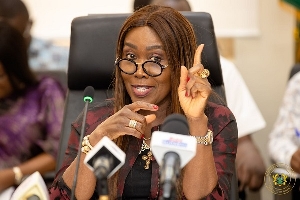- Home - News
- TWI News | TV
- Polls
- Year In Review
- News Archive
- Crime & Punishment
- Politics
- Regional
- Editorial
- Health
- Ghanaians Abroad
- Tabloid
- Africa
- Religion
- Election 2020
- Coronavirus
- News Videos | TV
- Photo Archives
- News Headlines
- Press Release
Opinions of Sunday, 9 August 2015
Columnist: Okoampa-Ahoofe, Kwame
NDC Faux-Socialism Destroying Health Insurance Scheme
By Kwame Okoampa-Ahoofe, Jr., Ph.D.
Garden City, New York
E-mail: okoampaahoofe@optimum.net
The current fiscal difficulties facing the National Health Insurance Scheme (NHIS), established under the tenure of the kufuor-led New Patriotic Party (NPP) government, has everything to do with the gross incompetence of the Mahama-led National Democratic congress (NDC) and, before that, the Mills-Mahama-led National Democratic Congress (See "Health Insurance Authority Urges Review of Scheme" Ghana News Agency / Ghanaweb.com 8/1/15). We must quickly point out that it was Chairman Jerry John Rawlings, the NDC's founding-father and Ghana's longest-ruling dictator, who supervised the effective destruction of the old welfarist system dating from the British colonial era.
Chairman Rawlings would introduce the so-called Cash-And-Carry System, a hard-nosed capitalist-oriented regime that was more extortionate than even the most people-insensitive and extortionate healthcare system in the West. We must also recall the fact that at the time that then-Candidate John Agyekum-Kufuor proposed the people-centered universal National Health Insurance Scheme (NHIS), leading political opponents like then-Vice-President John Evans Atta-Mills, late, pooh-poohed the entire proposition as a pipe-dream. The ironic reality is that once the Kufuor-minted health-insurance system kicked into operation, it was the very National Democratic Congress politicians, especially NDC parliamentarians, who were among the very first to line up and take maximum advantage of the system.
You see, the NDC operatives are more adept at consuming what their more savvy and progressive opponents have created than either improving upon the same or presenting the country with better facilities or delivery systems. Otherwise, how could we come by a system which allows malingerers, most of them presumable NDC freeloaders, to visit the hospital 15 times a day, not even a week, two weeks or even a month! No wonder Mr. Anthony Gingong, the payment director at the National Health Insurance Authority (NHIA), bitterly complains that Ghana has the most expensive healthcare system in the world. Then also, how does any government, least of all a morally and politically regressive government like the Mahama regime, develop any efficient healthcare system with a lawyer as its Minister of Health?
Even the United States, which easily boasts of one of the most efficient healthcare systems in the world, has never named a non-medical professional as its Health and Human Services Secretary. How stupid can we be as a government and a people? Indeed, one would have thought that the first order of business of President Mahama's first Health Minister would have been a thorough review of healthcare delivery in the country and even more importantly, the way in which countries with the most efficient welfarist healthcare systems like Canada, Australia and France go about them. Instead, what we have had is a government hell-bent on scoring cheap political points by swamping our health-insurance system with incorrigible parasites and pathological freeloaders who abjectly lack both the discipline and responsibility in helping the government take good care of a pretty good thing.
Not very long ago, we even had the then-Candidate Atta-Mills deceiving poor and unsuspecting Ghanaian voters into believing that a viable health insurance program could be run with the payment of a nominal one-time premium. Now, here are a few things that may have to be done if the National Health Insurance Scheme is to survive in the foreseeable future. One, every registrant or policyholder must be registered with a single particular hospital or health center and be assigned a primary care physician or general practitioner. This is the doctor that the registered patient has to be seen and treated by anytime that the patient visits the hospital or clinic. If the patient needs to be seen and/or treated by a medical specialist, either within the same facility or elsewhere, it is the primary care physician or one's regular doctor who makes such decision.
About the only time that the patient may see a differet primary care physician must be in the absence of his/her regular doctor, who may either be off-duty for that particular day or on leave. And the decision of which non-regular primary care physician to see must be made by the medical director or the latter's deputy in the regular clinic or healthcare facility attended by the patient. The only exceptions are cases of emergency, or sudden illness or injury such as one sustained in an accident away from the patient's residential neighborhood, in which case it is invariably the ambulance crew or whoever happens to convey the patient to the nearest hospital who makes the decision of where to go. Here also, the choice of emergency hospital must be based on proximity and the degree and/or the seriousness of the illness.
In the case of cutting down the prohibitive cost of drugs, hospital administrators and/or healthcare providers and the health-insurance operatives could work out mutually beneficial deals with the most efficient and competitive pharmaceutical companies, both domestic and overseas. These suggestions are very basic, which means that they are intended to be studied and further amplified by specialists and those with decades of experience and expertise in the field.
_____________________________________________________________
Entertainment









